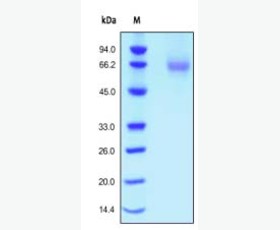Recombinant Human Tsukushin/TSKU
| Product name: | Recombinant Human Tsukushin/TSKU |
| Source: | Human Cells |
| Purity: | Greater than 95% as determined by reducing SDS-PAGE. |
| Buffer Formulation: | Lyophilized from a 0.2 μm filtered solution of PBS,pH 7.4 . |
| Applications: | Applications:SDS-PAGE; WB; ELISA; IP. |
| Storage: | Avoid repeated freeze/thaw cycles. Store at 2-8 oC for one month. Aliquot and store at -80 oC for 12 months. |
| UOM: | 100ug/50ug/200ug/1mg/1g |
| Source | Human Cells |
| Description | Recombinant Human Tsukushin is produced by our Mammalian expression system and the target gene encoding Thr17-Leu353 is expressed with a 6His tag at the C-terminus. |
| Names | Tsukushin,Tsukushi,E2-induced gene 4 protein,Leucine-rich repeat-containing protein 54,E2IG4, LRRC54, TSK |
| Accession # | Q8WUA8 |
| Formulation | Lyophilized from a 0.2 μm filtered solution of PBS,pH 7.4 . |
| Shipping |
The product is shipped at ambient temperature. |
| Reconstitution |
Always centrifuge tubes before opening. Do not mix by vortex or pipetting. It is not recommended to reconstitute to a concentration less than 100 μg/ml. Dissolve the lyophilized protein in ddH2O. Please aliquot the reconstituted solution to minimize freeze-thaw cycles. |
| Storage |
Lyophilized protein should be stored at < -20°C, though stable at room temperature for 3 weeks. Reconstituted protein solution can be stored at 4-7°C for 2-7 days. Aliquots of reconstituted samples are stable at < -20°C for 3 months. |
| Purity |
Greater than 95% as determined by reducing SDS-PAGE. |
| Endotoxin | Less than 0.1 ng/µg (1 IEU/µg) as determined by LAL test. |
| Amino Acid Sequence |
TRPCFPGCQCEVETFGLFDSFSLTRVDCSGLGPHIMPVPIPLDTAHLDLSSNRLEMVNESVLAGP GYTTLAGLDLSHNLLTSISPTAFSRLRYLESLDLSHNGLTALPAESFTSSPLSDVNLSHNQLREV SVSAFTTHSQGRALHVDLSHNLIHRLVPHPTRAGLPAPTIQSLNLAWNRLHAVPNLRDLPLRYLS LDGNPLAVIGPGAFAGLGGLTHLSLASLQRLPELAPSGFRELPGLQVLDLSGNPKLNWAGAEVFS GLSSLQELDLSGTNLVPLPEALLLHLPALQSVSVGQDVRCRRLVREGTYPRRPGSSPKVALHCVD TRDSAARGPTILVDHHHHHH
|
| Background | TSKU is a secreted protein and contains 10 LRR (leucine-rich) repeats and 1 LRRNT domain. The alternative splicing of TSK RNA leads to the formation of twoisoforms (TSKA, originally designated as TSK, and TSKB) that differ in their C-terminal region .The crucial function for TSK in promoting formation of the primitive streak and Hensen'snode by positively regulating VG1 activity . In Xenopus embryos, TSK can block BMP function and induce a secondary dorsal axis,while it can dorsalize ventral mesoderm and induce neural tissue in embryonic explants.TSK directly binds VG1 in vitro, and that TSK and VG1functionally interact in axis formation, as shown by biological assays performed in chick and Xenopus embryos . |














